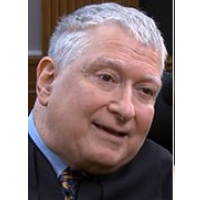When Investigators Realize Their Wiretap Has Mistakenly Uncovered a Different Crime, They Must Stop Listening, Rules Court
 Judge Ronald Gould
Judge Ronald Gould
By Ryan Borchers, Courthouse News Service
PASADENA, Calif. (CN) — Imagine a scene straight out of an Alfred Hitchcock movie: You call a phone number, unaware that it has been wiretapped as part of a federal investigation, and incriminate yourself in a different crime altogether.
According to a 2-1 ruling (pdf) filed by the Ninth Circuit on Wednesday, though, you might be in luck.
The majority of a three-judge panel ruled that investigators have to stop listening to a phone call as soon as they should reasonably know that the call does not involve their particular investigation.
The underlying case involves a man named Michael Carey, who was identified by federal agents as a speaker during a warranted phone tap as part of their investigation into a drug-smuggling and distribution conspiracy perpetuated by Ignacio Escamilla Estrada, court records show.
Over the course of the week-long surveillance, though, agents realized that Escamilla was not one of the people using the phone. They continued to listen in anyway, believing the speakers might be part of the conspiracy.
Later, using information from the wiretap, they arrested Adrian Madrid at a traffic stop and learned that the two drug conspiracies were unrelated. How one of Carey's associates got Escamilla's number is not clear from the case record.
Carey was arrested and charged with conspiracy to distribute cocaine as part of Madrid's conspiracy and a federal judge rejected his motion to suppress evidence from the wiretap. Carey pleaded guilty with the condition that he be allowed to appeal the denial of his motion.
Judge Ronald Gould, who delivered the Ninth Circuit's decision, noted the novelty of the question: Is the evidence admissible when a valid wiretap helps catch someone else who happens to be involved in a different crime?
Applying the same reasoning used by the Seventh Circuit, Gould wrote that investigators may use such evidence under the Fourth Amendment's "plain view" doctrine if they discover it without realizing their mistake. However, once the mistake is discovered, the search has to be discontinued.
What bearing that has on Carey's case is not yet clear.
"The record does not indicate what evidence was obtained before the agents knew or should have known that they were listening to calls outside of the Escamilla conspiracy," Gould wrote. "In fact, at some point agents consulted with federal prosecutors about whether they could or should continue to intercept calls on the wiretap."
The judge continued, "Because the parties staked out polarized positions before the district court—the government arguing for all wiretap evidence, Carey for none of it—and because the district court adopted the government's position in denying the motion to suppress, the record lacks the findings necessary to determine what evidence was admissible against Carey."
The Ninth Circuit therefore remanded the case to Southern California Federal Court on an open record.
Judge Alex Kozinski dissented. He agreed that investigators should stop listening to phone calls as soon as they know the conversation is outside the subject of the investigation, but said the case should not be remanded on an open record because Carey did not contradict FBI Special Agent Christopher Melzer's declaration that the agents believed the conversations could still have something to do with Escamilla.
"Carey was given full discovery and thus had access to the recordings and transcripts of the intercepted phone conversations," Kozinski wrote. "If he believed that the agents should have known prior to the traffic stop that this was a different conspiracy, he could have pointed this out to the district court."
Kozinski said he would "affirm the district court's judgment rather than give Carey a mulligan."
"This isn't a case where we've announced an unforeseen rule, surprising a defendant who didn't have the opportunity to argue about its application in the district court," he wrote. "Carey's problem is that he failed to demonstrate in the district court that any evidence should be suppressed under the rule he advocated."
Gould responded to Kozinski's argument by saying that Carey objected to Melzer's declaration on the grounds that it was incomplete.
"The district court recognized Carey's belief that 'there are things that are not in his declaration that you believe would be relevant facts,' and the court was aware of Carey's alternate request to take evidence about Melzer's level of knowledge regarding the relationship between Escamilla and the phone calls," Gould wrote in the majority opinion. "But because the district court then applied the wrong legal standard, the district court did not believe that any additional evidence was necessary."
Knut Sveinbjorn Johnson from San Diego represented Carey, while Assistant U.S. Attorney Peter Ko represented the government.
The panel's decision, Johnson said, is a sign that the government needs to stop listening to people's conversations when it knows it should not listen anymore.
"I think it's a good result for people's privacy interests," he said.
The U.S. Department of Justice could not be reached for comment Wednesday.
To Learn More:
USA v. Michael Carey (U.S. Court of Appeals for the Ninth Circuit) (pdf)
Bad Wiretaps Force Prosecutors to Drop Charges in $30 Million Stock-Fraud Case (by Ken Broder, AllGov California)
- Top Stories
- Unusual News
- Where is the Money Going?
- Controversies
- U.S. and the World
- Appointments and Resignations
- Latest News
- Musk and Trump Fire Members of Congress
- Trump Calls for Violent Street Demonstrations Against Himself
- Trump Changes Name of Republican Party
- The 2024 Election By the Numbers
- Bashar al-Assad—The Fall of a Rabid AntiSemite






Comments